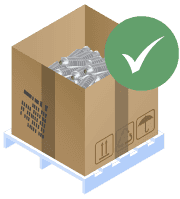Refining Process
What Should You Look for When Choosing a Catalytic Converter Processor?

Before the pandemic brought a change to our transportation habits, a 2018 study concluded that the automotive industry accounted for 9% of all transportation-associated emissions of greenhouse gases. With an increased awareness of the challenges posed by the climate crisis, the automotive industry is taking concrete steps to build a more sustainable future.
One way to lessen vehicle emissions is with catalytic converters, emissions control devices that convert toxic gases into less-harmful pollutants. However, these converters are made up of platinum, palladium, and rhodium, otherwise known as platinum group metals (PGMs), and the mining of these metals is itself damaging to the environment. That’s why recycling converters has become a worldwide business. This process extracts PGMs from catalytic converters so that the metals can be reused, reducing the need for continued environmentally risky mining
How does catalytic converter recycling work?
Converter recyclers acquire their material through competitive buying and/or by processing end-of-life vehicles. Once recyclers have accumulated enough catalyst material, they ship it off to a converter processor, whose primary role is to cut and decan the converters in order to extract the precious metals.
Choosing a catalytic converter processor
It’s important to get a feel of a processor’s business, such as their machinery, and how they keep their suppliers informed and help them make the right market decisions. Here’s a list of what to look for when choosing a converter processor.
Supplier screening protocols
It’s important to partner with a catalytic converter processor that has rigorous and up-to-date onboarding and sourcing protocols. Processors should have strict anti-money laundering protocols and know-your-customer screenings, given a rapidly changing regulatory environment and the risk of abuse of bad actors. Measures like inventory and invoice tracking and thorough documentation contribute to transparent and ethical transactions. If your potential processor has these protocols in place, they’re a partner you can trust.
Shipping solutions
When shipping material from your facility to theirs, processors will typically offer their own transport. So you should expect your potential processor to explain what their transport solutions are and who they work with. If your materials are damaged, lost, or stolen during transport, your material and its value must be protected. Converter toll-refiners must have insurance in place for all their shipping solutions.
The most economical way of transporting your material is by shipping with your catalytic converter processor, so it’s important to make sure that your contract includes transportation fees. Since some processors will try to hide these fees, demand transparency or forget about that processor!
Grading or counting systems
Does the catalytic converter processor you’re looking to work with offer online tools for grading? Do they have an accurate and established grading system of their own? These are important factors, as grading and counting systems help you secure the best prices for your materials.
Grading Or Counting Systems At Your Processor's Facility
When material arrives at a processor’s facility, it is graded, meaning material types are separated, cores are verified for their precious metal concentration, and total units are counted. Each company’s grading system varies, so it’s important for you, as a supplier, to gain insight into their grading systems.
In-House Access To Grading Tools
Having access to grading tools at your recycling facility will help you keep track of what you’re shipping in terms of material type and metal concentrations. It can also help you estimate how much you can earn from your shipment.
Grading tools help keep a record of your buying trends, which help you maintain a competitive edge when you’re buying or at auction.
Decanning & dust capture
Decanning is the process of removing any metal pipes or shells in order to expose the converter core. In this process, the most important step is dust capture since the dust produced from the decanning process has a high concentration of PGMs.
Assaying and sample preparation
Processors determine value by assaying – or examining – a sample of your converter load. After your converters are decanned, the loose ceramic remaining is crushed, commingled, and homogenized, the result being a fine powder, from which a sample is taken for assay.
What To Look For In A Processor’s Assaying Process
If the catalytic converter processor that you choose doesn’t have the right sample preparation technique, this will affect your profits. That’s why the sample should be taken from a commingled and homogenized powder of all your material.
XRF Benchtop And ICP
When using XRF benchtop, a lab technician will put a sample of your catalyst material load into the machine. Your sample will emit secondary x-rays, which are analyzed to determine the concentration of PGMs.
When using Inductive Coupled Plasma (ICP), the liquid sample is injected into plasma and placed into the machine. The sample emits a light and the machine measures its intensity to get accurate PGM concentration.
To get accurate and precise results, your potential processor should have an ICP machine. Because assay results need to be precise for payment and hedging, most converter processors rely on the “golden standard” of PGM analysis, which is the ICP machine.
Smelter
This is the step where each precious metal is refined into a usable form. Most processors have a partnership with an outside smelter. Because the smelting process is so complex – from melting, grinding into a fine powder to chemical leaching – make sure your processor is using a well-established smelter.
Terms of Your Agreement
Now comes the tricky part. When choosing a catalytic converter processor, it’s important to know the agreement terms inside out. Here are a few things to look for in the agreement terms:
- Percentage of recovered metals
- Refining fees
- Treatment charges
- Small lot fees
- Interest rates
- Lease rates
It’s important to have clarity on these topics from a processor so that you can evaluate if their terms fit into your business model.
Knowledge is Power
In order to hedge confidently and continue buying & acquiring converters, having the right knowledge is crucial. This means knowing when and how to hedge, knowing how to buy competitively and generate a profit, and knowing all the ins and outs of the industry to keep growing your operations.
Knowing When To Hedge
It’s important that your processor helps you understand hedging and what their hedging flexibility looks like. Staying up to date with platinum, palladium, and rhodium market prices is a must when dealing with hedging. With constant updates on PGM market prices, you can hedge at any minute and any time.
Pricing Knowledge
Knowledge of converter pricing will help you buy competitively and generate profit so you can expand your operations. Make sure the converter processor you choose provides access to their price list and a catalog of serial numbers.
Processors only succeed when their suppliers are flourishing, so if you’re buying competitively and growing your operations, your processor will grow as well. If they aren’t helping you expand, you need to start looking elsewhere.
Now you’re ready to choose a catalytic converter processor!
Having access to reliable and ethical information is vital to successfully recycle your catalytic converters. Check out PMR’s extensive tools to expand your knowledge of the converter recycling industry.
The world of catalytic converter recycling is a complex industry with a lot of moving parts. That’s why it’s important to work with a catalytic converter processor that will be your ally and partner throughout the process.

